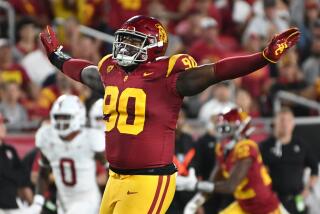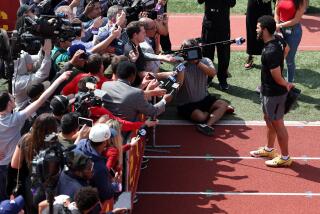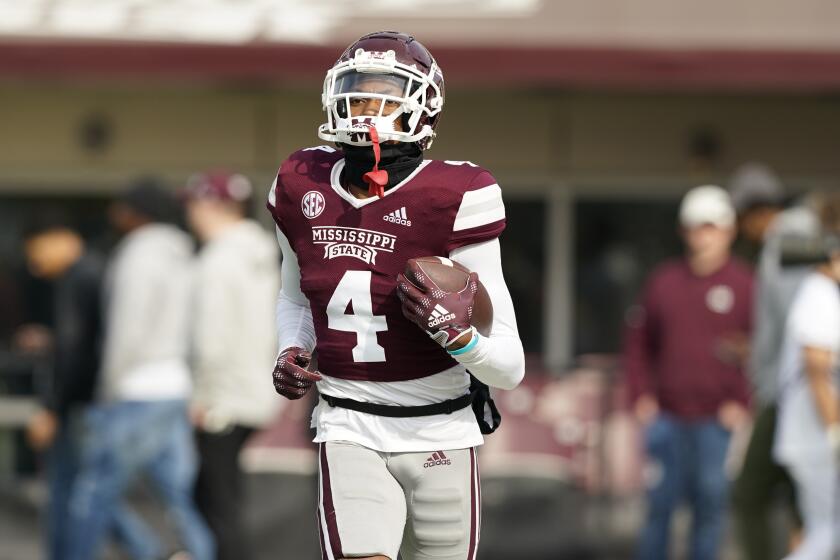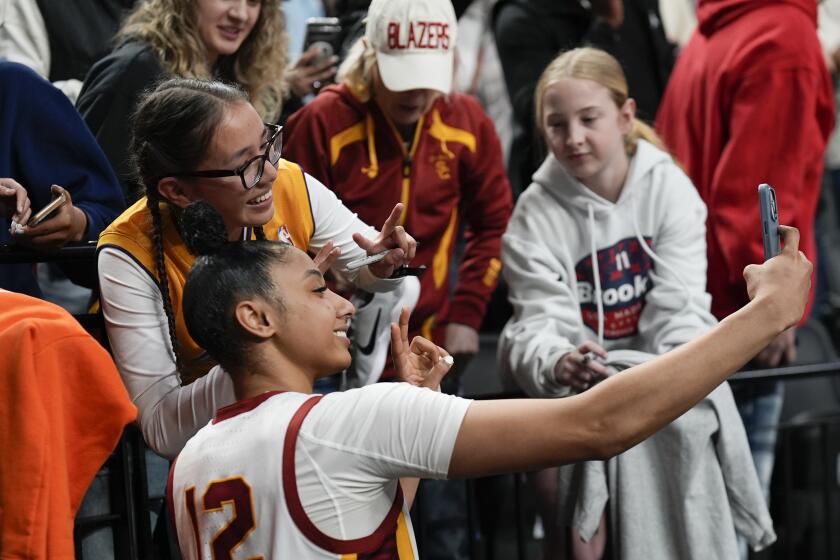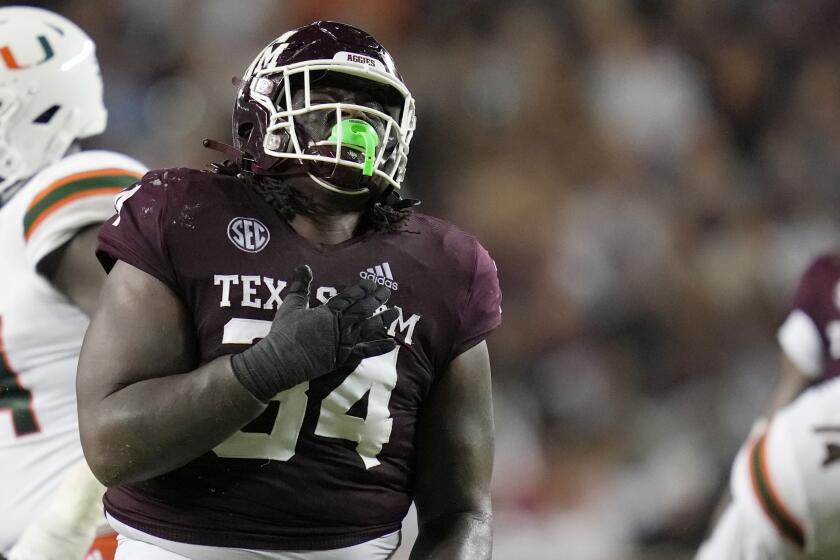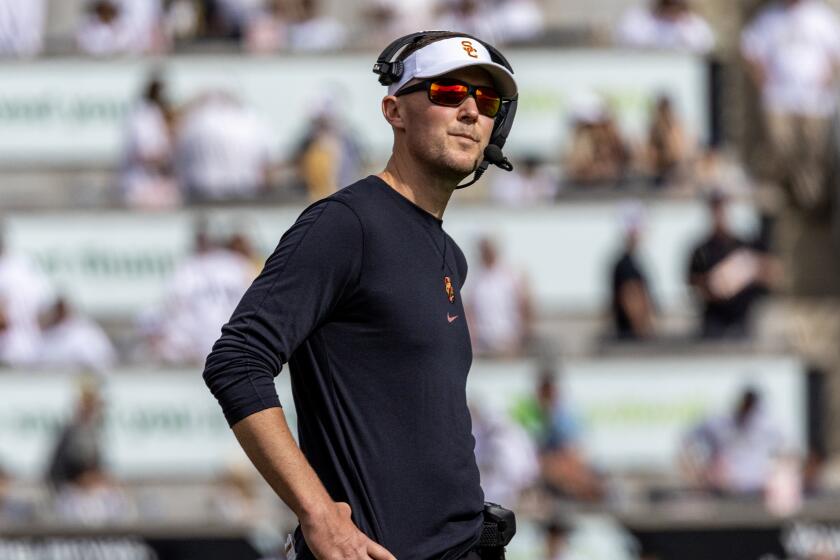USC’s Javorius Allen makes the most of his chance
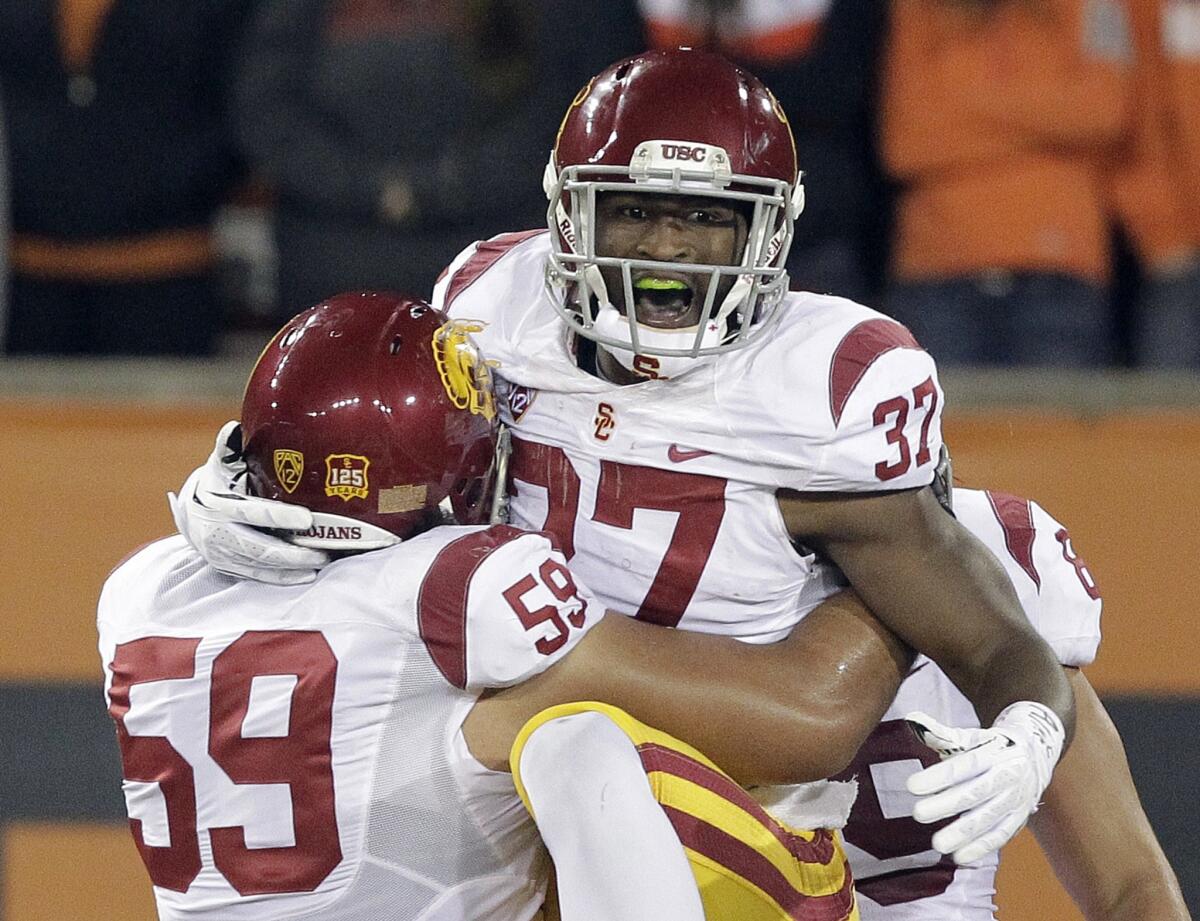
Ed Orgeron removed his sideline headset during the final seconds of USC’s victory at California last week and grasped hands with tailback Javorius Allen.
“It’s been a loooong time coming,” Orgeron sang heartily in his Cajun drawl.
“Change gonna come,” Allen joined in, pumping the coach’s fist.
Orgeron and Allen were reciting the words to one of Allen’s favorite songs: Sam Cooke’s 1964 classic “A Change Is Gonna Come.”
Much has changed in USC’s program — and for Allen — since Orgeron replaced Lane Kiffin in late September.
The Trojans have won three games in a row and four of five heading into Saturday’s matchup against fifth-ranked Stanford at the Coliseum.
Allen’s dramatic emergence from the bottom of the depth chart helped spark the turnaround. At Cal, for the second consecutive game, the third-year sophomore from rural Florida scored three touchdowns, all in spectacular fashion.
“Coach O feels where I’m coming from,” Allen said. “We’ve got a great bond.”
Before and after every game, Allen thanks Orgeron for the opportunity and for trusting in him. And he thinks daily about others who have done the same.
“I just want to thank God for putting me in this situation,” he says. “And putting the people in my life like he did.”
::
Javorius Donte Allen grew up about 20 miles northeast of Tallahassee, in the small town of Miccosukee.
“A country town,” Allen says, chuckling. “As country as can be.”
The second of three brothers, he spent most of his early years in the care of Rosa Brown, his maternal grandmother. Brown filled their trailer with discipline and love, demanding manners and respect for elders.
“I didn’t have him,” she says of Allen. “But he’s my baby.”
When he was small, Allen often played by himself, picking up pine cones and pretending they were footballs. He ran about the yard, making up scenarios in his mind.
One day, his grandmother looked outside, saw him running about and asked what he was doing. “I’m playing football,” Allen said.
“Football? You don’t have no ball,” Brown said. So she scraped up enough money to buy him one.
“I took it to school,” Allen recalls. “I took it everywhere.”
Allen’s world was temporarily shattered at age 12 when his older brother, Devon Brown, was convicted of attempted murder and sentenced to prison.
“That really hurt me because he was like a father to me,” Allen said. “For a couple weeks, I didn’t know how to react. I just never talked to anybody.”
Brown told her grandson there was nothing he could do to change what had happened to his brother.
“I don’t want you following in his footsteps,” she told him. “Go to college. Play football. Make something for yourself.”
::
The Carrie Wilson Boys & Girls Club in Miccosukee, and the people Allen met there, changed his life.
“When I was up there, I never worried about things like how to get the next meal or how am I going to get home,” he said. “I would just enjoy myself, and when that time came for it to close, I just figured it out from there.”
In 2003, Davis Houck, a professor at Florida State, began volunteering at the club. Houck quickly noticed the 11-year-old Allen’s athletic ability, and was also was struck by something else. “One of the first things I sensed about him is he would listen,” Houck recalled.
A year later, Mickey Cullen became the club director. Cullen drew out Allen by giving him small responsibilities. He and his wife, Alice, hosted Javorius and his younger brother, Deon’shaye, in their home for dinner or just to hang out and play video games. They also attended church together.
“It felt like I was part of the family,” Allen said.
With no means of transportation, Allen’s football career might have ended before it began had Cullen not volunteered to pick him up from practices and drive him home from middle school. “It was an extra hour to hour-and-a-half, but it was worth it because it gave him a chance to do what he wanted to do,” Cullen said.
Alice Cullen stayed in touch with teachers and monitored Allen’s progress. When it was time for high school, the Cullens offered to take Allen into their home so that he would have the supplies and support to help him be successful.
The Cullens’ grown children were out of the house, so Allen suddenly had his own spacious upstairs room and access to a computer. But he also was held accountable.
“What are you all doing? Where are you all going? You should have told me ahead of time,” Allen recalled “Miss Alice” saying.
“I stayed home and thanked her for doing that,” he added, “for having me so grounded and showing me that somebody’s got to slow you down sometimes.”
Alice also taught Allen how to drive. She took him shopping. She made sure he had a new shirt for dances and a flower for his date. “Everything a mom would do,” Mickey said.
One day, while walking with Alice in the mall, someone came up to Allen, glanced at the white woman he was with said, “That your mom?”
“I said, ‘She’s my godmother,’” Allen recalled. “That made her feel good and put a smile on her face.”
In 2009, Alice Cullen was diagnosed with cancer. In June, Allen traveled to a hospice in Florida and spent three days visiting at her bedside.
“She told me how much she loved me,” Allen said. “On Sunday, she couldn’t open her eyes, but she touched my face and she felt me crying.”
Alice died a few days later.
“I’m just happy she waited till I got there and we were able to talk,” Allen said. “All I could think about on the way home was that she was the best thing to happen to me.”
For games, Allen writes “ALICE” in black marker on tape over his left wrist. After he scores a touchdown, he kisses his wrist and points to the sky.
“I still have her text messages,” he said. “Last week, before the Cal game, on the ride to the stadium, I just read over them.”
::
Allen came to USC from Tallahassee Lincoln High, a school that also produced former Trojans defensive backs T.J. Bryant and Jawanza Starling.
Lincoln is where Allen got his nickname, “Buck.” With a tight end named Ja’Baris Little also on the team, confusion reigned whenever Javorius or Ja’Baris was called by teammates or coaches.
“They said, ‘We’re just going to call you Young Buck,’” Allen said.
Allen’s junior season ended in the first game when he broke his left leg while making a touchdown catch. But he came back as senior, rushed for more than 1,500 yards and helped lead Lincoln to a state title.
“He’s always been real quiet, real respectful, ‘Yes sir, no sir. Yes ma’am, no ma’am,” Lincoln Coach Yusuf Shakir said. “Whenever I told him I needed him, he’d just say, ‘I got you, Coach.’”
When it came time to choose a college, Allen thought long and hard about Alabama. He had always been a fan of the Crimson Tide and the Cullens both had attended Alabama. Allen had attended an Alabama game with Mickey and his son.
But Allen said the Cullens never told him he should go to Alabama. “They made jokes like, ‘You better not go to Auburn,’ but other than that they never threw it in my face,” he said, laughing.
In February 2011, Allen signed with USC, where Bryant and Starling were playing.
“I knew if I came here I had somebody that would have my back or could call upon,” he said. “And I never looked at the depth chart.”
::
Allen read Tommie Robinson’s bio and smiled. Robinson, hired in February to replace Kennedy Polamalu as the Trojans’ running backs coach, was from Alabama.
“I was like, ‘Man, I know he’s country just like I am,’” Allen said.
Allen had redshirted in 2011 after the season began because of academic issues that necessitated him completing online courses before he was cleared by the NCAA. In 2012, he practiced mostly with the scout team as Penn State transfer Silas Redd, senior Curtis McNeal and sophomore D.J. Morgan carried the ball in games.
Robinson’s arrival provided hope. “He came into the first meeting and said, ‘All right y’all, quiet down. Listen up, sapsuckers,’” Allen recalled, laughing. “He started talking and I was like, ‘Yeah, it’s going to be good.’”
Robinson said Allen “mentioned to me that he didn’t work like he should have and got a little disappointed as far as being down the depth chart. To get out of the situation, you’ve got to work. That’s the message I tried to send to all of them.”
Allen enjoyed a productive spring, but with Redd sidelined because of a knee injury, sophomore Tre Madden and freshman Justin Davis emerged as the top tailbacks at the start of the season.
Allen played against Hawaii, Boston College and Arizona State, but his fortunes changed after Kiffin was fired and Orgeron announced that game personnel decisions would be handled by assistants.
Against Arizona on Oct. 10, every tailback played and Allen scored two touchdowns.
A hamstring injury suffered by Madden against Arizona and a season-ending ankle injury suffered by Davis against Notre Dame moved Allen up the depth chart.
Against Oregon State, he broke out with three touchdowns, setting the stage for last week’s performance at Cal.
“It’s not because we discovered new talent,” Robinson said. “The talent was there. … It was just his time.”
::
Allen’s rise on the field has coincided with improvement in the classroom.
After a shaky start his freshman year, he has tapped USC’s academic resources and is making major strides, pointing to senior associate athletic director Magdi El Shahawy and learning specialists Denise Kwok and Mimi Butler as guiding lights.
“Everybody needs somebody to believe in them in order to achieve success,” Butler said. “He’s been lucky he had a lot of people that believed in him.”
Teammates also have rallied around Allen, celebrating his perseverance on and off the field. “His story is like no other,” senior cornerback Josh Shaw said. “What he has gone through and where he is now, you can’t help but be happy for the guy.”
Allen remains in contact with his grandmother and his mother, Melissa, whom he lived with his final two years of high school — “We have a great relationship,” he said. — and communicates with his younger brother. Last week, he wrote to his older brother in prison.
He also stays in regular contact with Cullen — “I love him like a father” — Houck and others who guided him.
A sociology major, Allen said he would one day like to work with children, to help them as he has been helped.
For now, he is concentrating on making the most of his time at USC.
After the Oregon State game, he said he spoke on the bus with Orgeron. They talked about their favorite songs. Allen first heard “A Change Is Gonna Come” while living with his grandmother. Orgeron liked it as well.
That’s how they came to singing it together on the sideline.
A change for Allen has come.
gary.klein@latimes.comTwitter: @latimesklein
More to Read
Go beyond the scoreboard
Get the latest on L.A.'s teams in the daily Sports Report newsletter.
You may occasionally receive promotional content from the Los Angeles Times.
